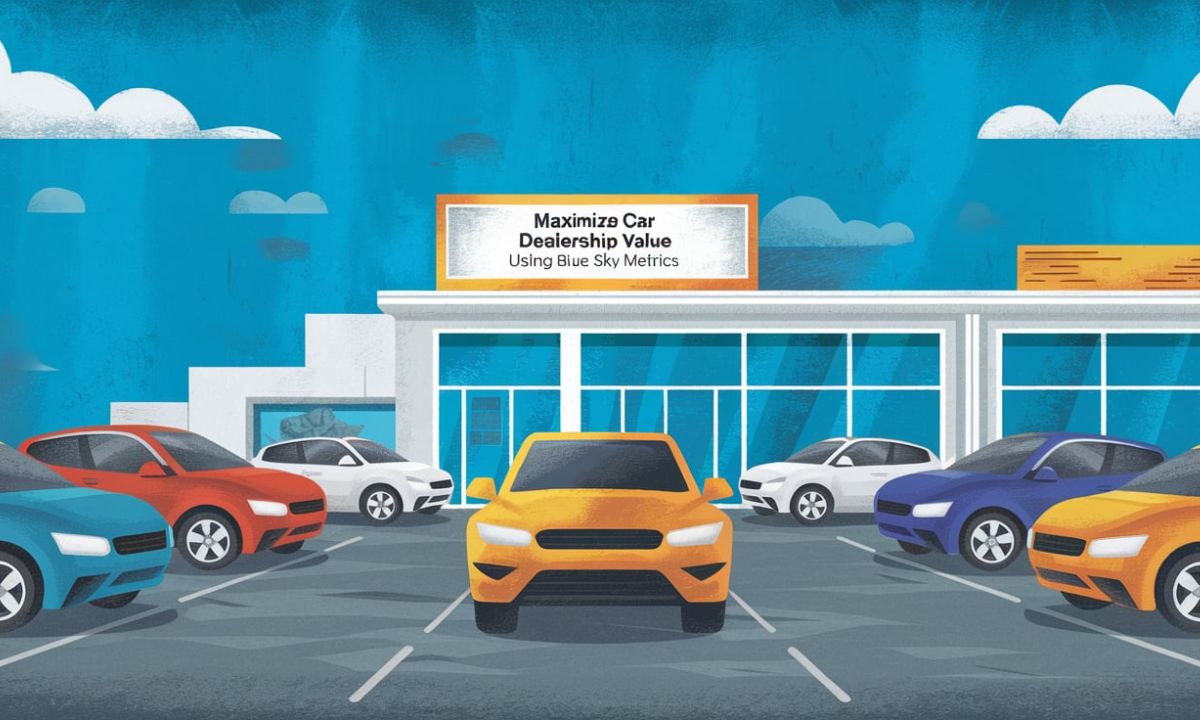The world of car dealership valuations is intricate and constantly evolving. Several factors play a critical role in determining a dealership’s value. Among these factors, Blue Sky Metrics have emerged as one of the most important indicators in determining the worth of a dealership. These metrics go beyond just the physical assets and focus on intangible factors that can significantly affect a dealership’s valuation. In this blog post, we will explore the importance of Blue Sky Metrics in car dealership valuation and its impact on car dealer capital.
Understanding Blue Sky Metrics
Blue Sky Metrics refer to the intangible elements that contribute to a car dealership’s overall value. These include customer loyalty, brand reputation, market position, and exclusive franchise agreements. Unlike traditional valuation methods that focus on hard assets such as inventory, buildings, or equipment, Blue Sky Metrics highlight the factors that create long-term growth and sustainability for a dealership. The concept of Blue Sky value is often used by car dealerships during mergers, acquisitions, or when determining the sale price of a business.
A dealership’s Blue Sky value represents how much potential the business has in terms of revenue, customer retention, and future profitability. It’s often a key factor when determining how much a dealership can command in the marketplace.
The Role of Blue Sky Metrics in Car Dealership Valuation
Customer Loyalty and Brand Reputation
One of the primary components of Blue Sky value is customer loyalty. A dealership that has built long-lasting relationships with its customers has a significant advantage in the marketplace. Loyal customers not only return for future purchases but also recommend the dealership to friends and family. Customer loyalty can result in a steady stream of revenue, and a strong reputation often leads to word-of-mouth marketing that enhances brand awareness.
Brand reputation is also essential in the car dealership industry. A dealership that has built a trusted name in the community is likely to attract more customers. This goodwill can translate into a higher Blue Sky value. Dealers who invest in customer satisfaction, offer reliable service, and ensure a positive buying experience are more likely to develop a strong brand reputation.
Market Position and Location
The market position of a dealership is another significant contributor to Blue Sky value. A dealership that is recognized as a leader in its area will have a competitive edge. This can be due to a range of factors such as offering a wider selection of cars, competitive pricing, or having a great service department.
In addition to market position, the location of the dealership is a key factor. High-traffic areas or prime locations can make a significant difference in attracting customers. If a dealership is located in an area with a high concentration of potential buyers, its Blue Sky value will increase. A dealership in a prime location has higher chances of success because of increased foot traffic and visibility, leading to greater sales potential.
Manufacturer Relations and Exclusive Contracts

Strong relationships with manufacturers can significantly affect a dealership’s Blue Sky value. Dealerships that have exclusive franchise agreements with major automotive manufacturers often enjoy several advantages. These agreements give dealerships access to popular car models, which increases customer interest and sales.
Exclusive contracts with manufacturers also help in building credibility and trust with customers. For instance, if a dealership sells a premium brand, it is likely to attract a more affluent customer base, which can lead to higher sales and greater profits. Manufacturers are typically selective in their dealership partnerships, so a dealership with an exclusive agreement with a top-tier brand is often considered a more valuable business.
Historical Financial Performance and Future Earnings Potential
A dealership’s financial history plays a crucial role in determining its Blue Sky value. Past performance, such as steady profit growth, high revenue, and positive cash flow, are critical indicators of a dealership’s success. Dealerships with a solid financial track record are seen as more stable investments.
Equally important is the future earnings potential of a dealership. Potential buyers and investors will look at the future outlook for the dealership, considering factors such as the growth potential in the local market, upcoming car models, and economic conditions. A dealership with a clear path for continued success and revenue growth will have a higher Blue Sky value.
Key Components of Blue Sky Metrics
Several key factors contribute to a dealership’s Blue Sky value. These include:
| Component | Impact on Blue Sky Value |
| Customer Loyalty | High customer retention boosts long-term revenue and stability. |
| Brand Reputation | A positive reputation builds trust and attracts new customers. |
| Market Position | A strong position in the local market increases sales potential. |
| Manufacturer Relations | Exclusive contracts with manufacturers increase credibility and product availability. |
| Profitability | Historical and future profitability influences investment value. |
| Location | Prime locations lead to higher foot traffic and visibility. |
Evaluating Blue Sky Metrics in Car Dealership Capital
How Blue Sky Metrics Affect Dealership Sales and Mergers
Blue Sky Metrics have a substantial impact on car dealership sales, mergers, and acquisitions. When a dealership is being sold, its Blue Sky value plays a crucial role in determining the price. Buyers will evaluate factors like customer loyalty, brand reputation, market position, and manufacturer relations to assess the dealership’s potential for future growth and profitability.
Mergers and acquisitions are often driven by the desire to combine synergies. Dealerships with strong Blue Sky values can command higher sale prices due to their established customer base, reputation, and long-term prospects. Buyers are not just purchasing physical assets, but also the goodwill associated with the dealership, which can significantly affect the price.
The Relationship Between Blue Sky Metrics and Car Dealership Capital for Buyers
For potential buyers or investors, Blue Sky Metrics are a key consideration when evaluating a dealership’s capital value. A dealership with strong Blue Sky value can often command a higher price, as the buyer is essentially investing in both tangible and intangible assets. The stronger the Blue Sky metrics, the more likely the buyer is to secure a long-term, profitable investment.
The Future of Blue Sky Metrics in the Car Dealership Industry
As the car dealership industry evolves, especially with the rise of electric vehicles (EVs) and digital transformation, Blue Sky Metrics will continue to play a critical role. Dealerships that adapt to changing market trends, such as offering electric vehicles, providing online sales, or implementing digital customer engagement strategies, are likely to see an increase in their Blue Sky value.
Dealerships that focus on sustainability and align with growing consumer preferences for environmentally-friendly vehicles will be better positioned for the future. These factors can significantly increase a dealership’s Blue Sky value, ensuring that it remains competitive in a rapidly changing industry.
Driving Value Through Blue Sky Metrics
Digital Presence in Dealerships

In today’s market, a strong digital presence is increasingly important for car dealerships. Customers are increasingly turning to the internet for research, comparison, and even purchasing cars. Dealerships that invest in digital marketing, social media engagement, and online sales platforms are better positioned to boost their Blue Sky value. This digital presence allows dealerships to expand their reach, attract younger buyers, and build stronger customer relationships.
Dealerships that offer a seamless online-to-offline experience, including options for virtual tours, online financing, and home delivery, will enhance their brand reputation and create a more customer-friendly environment. These factors directly contribute to higher Blue Sky metrics.
EV Dealership Strategies
With the growing popularity of electric vehicles, dealerships that focus on selling and servicing EVs will benefit from an increased Blue Sky value. Consumers are becoming more conscious of the environmental impact of their purchases, and the demand for EVs is expected to rise significantly in the coming years. Dealerships that position themselves as leaders in the EV market will likely experience growth in customer loyalty, brand recognition, and sales volume, all of which contribute to higher Blue Sky value.
Table: Key Factors Influencing Blue Sky Metrics
| Factor | Influence on Blue Sky Value |
| Customer Loyalty | Leads to long-term revenue, increased sales, and positive reputation. |
| Market Position | Strong position increases competition and sales opportunities. |
| Manufacturer Relations | Exclusive brands increase credibility, stock, and demand. |
| Brand Reputation | Positive reputation builds trust, attracts customers, and raises valuation. |
| Financial Performance | Strong performance increases valuation and investment appeal. |
| Location | Strategic locations drive sales and visibility. |
FAQs
1. What are Blue Sky Metrics in car dealership valuation?
Blue Sky Metrics are intangible factors such as customer loyalty, brand reputation, and market position that influence a dealership’s valuation.
2. How do Blue Sky Metrics affect dealership sales?
They boost sales by enhancing customer retention, improving brand trust, and creating a competitive market position.
3. Why are exclusive franchise agreements important for Blue Sky value?
Exclusive agreements give dealerships access to popular brands, increase their credibility, and improve their inventory and sales.
4. Can Blue Sky Metrics increase the sale price of a dealership?
Yes, dealerships with strong Blue Sky Metrics often command higher prices because they offer long-term profitability and reduced investment risk.
5. How will Blue Sky Metrics evolve with the rise of electric vehicles (EVs)?
Dealerships focused on EVs will likely see increased Blue Sky value due to growing demand and environmental concerns.
Conclusion
Blue Sky Metrics are integral to car dealership valuations and capital. These metrics focus on intangible assets that represent a dealership’s potential for future growth, customer loyalty, and profitability. Dealerships with strong Blue Sky values are better positioned to attract investors, secure higher sale prices, and maintain long-term success. As the industry continues to evolve, especially with the rise of electric vehicles and digital transformation, Blue Sky Metrics will remain a critical factor in determining a dealership’s value in the marketplace. By focusing on building strong customer relationships, enhancing brand reputation, and adapting to market trends, dealerships can increase their Blue Sky value and secure a competitive advantage.
Read more information https://techyspirtz.com/
Visit my other websitehttps://verbvictories.online/

David is a seasoned SEO expert with a passion for content writing, keyword research, and web development. He combines technical expertise with creative strategies to deliver exceptional digital solutions.














